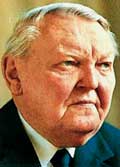Ludwig Erhard participated in World War I as artillery soldier and was seriously wounded in 1918. After the war he studied economics and sociology and graduated in 1925. Working for the Institute for Economic Research in Nuremberg, Erhard earned a reputation as an economic specialist and founded the Institute for Industrial Research in 1942. He served as economics adviser in Middle and Upper Franconia and as economics minister in the Bavarian Cabinet of Wilhelm Hoegner (1945-1946). In 1947 Erhard was assigned to the Special Money and Credit Department to prepare the currency reform and introduction of the German Mark (DM). Elected to the Bundestag as a candidate of the Christian Democratic Union (CDU), Erhard became federal economics minister (20 Sep 1949 - 16 Oct 1963) in the governments of Konrad Adenauer. He applied his "social market system" to the problems of economic renewal with phenomenal results, achieving what has often been called the German "economic miracle." In the third government of Adenauer, Erhard also became deputy federal chancellor (29 Oct 1957 - 16 Oct 1963), but tensions developed between the two politicians. Adenauer tried to prevent Erhard from being made his successor and proposed to nominate Erhard a candidate at the presidential elections against his will (24 Feb 1959), but the latter refused to run for the presidency (3 Mar 1959). When the resignation of Adenauer became inevitable, the CDU/CSU parliamentary group nominated (23 Apr 1963) Erhard as its candidate for the next elections of the Federal Chancellor. After the Federal President accepted Adenauer's resignation, the Bundestag elected Erhard the second Federal Chancellor on 16 Oct 1963. Almost all ministers, who served under Adenauer, continued in their offices in the Erhard's coalition Cabinets (CDU/CSU and the Free Democrats). Erhard's more liberal economic policy toward the East European states that maintained diplomatic relations with East Germany made maintaining the Hallstein Doctrine difficult. In addition, his position of favoring close coordination of German foreign policy with the United States was resisted by the "Gaullists," even those in his own party, who favored a continuation of Adenauer's close relations with France. His government was troubled by tepid foreign relations and a budget deficit, but after the elections to the 5th Bundestag (1965), Erhard was reelected as the Federal Chancellor and formed his second government with participation of the Free Democrats, who preserved their posts. On 23 Mar 1966 Erhard was elected federal chairman of the CDU. However, Erhard's decision to raise taxes in response to a slight recession in the summer of 1966 led to a disagreement with the four FDP cabinet members, who resigned their offices in October 1966. Left without a ruling majority, Erhard was forced to submit his own resignation on 30 Nov 1966 and was succeeded by Kurt Georg Kiesinger. In May 1967 Erhard was named honorary chairman of the CDU and handed the party leadership to Kiesinger elected the CDU federal chairman. Erhard kept his parliamentary seat as a CDU/CSU representative and twice served as president by age of the Bundestag (13 Dec 1972 and 14 Dec 1976). Biography source: [5] |

